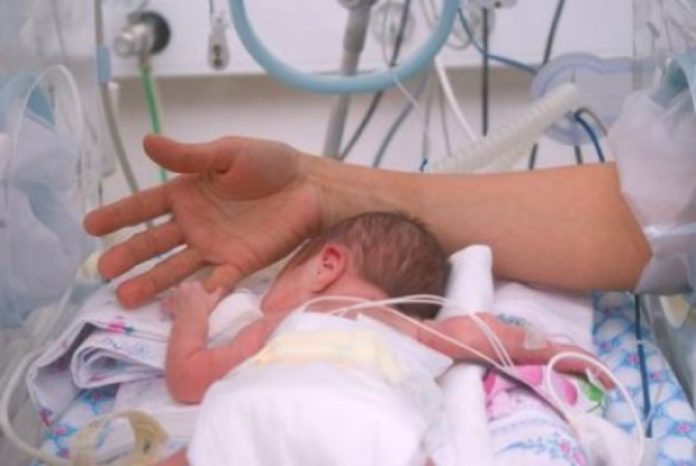The classic image of a newborn baby happily nestled in the proud parents’ arms is one we are all familiar with. Many of us are lucky enough to have one on the mantelpiece, but some families miss out on taking this photo.
Babies who come too early, often weighing under a kilogram, are rushed away from their parents to the neonatal intensive care nursery in a fight for survival. Babies are classified as preterm when they are born prior to 37 weeks’ gestation.
Within this group, those born prior to 32 weeks are classified as very preterm. In Australia, more than 5,000 babies are born very preterm every year, and it is these babies who are at greatest risk for a wide range of adverse outcomes.
A new baby is life-changing for all parents, but for those whose babies are born too early, the challenges can be immense.
Our research published today in JAMA Pediatrics reports concerning levels of psychological distress in both mothers and fathers of very preterm babies. We closely followed these families, assessing parental mental health every two weeks for the first 12 weeks after birth, then again six months later.
In the weeks immediately following the birth of their babies, 40% of mothers and 36% of fathers experienced clinically significant symptoms of depression. This was compared to just 6% of mothers and 5% of fathers of healthy full-term babies.
Rates of anxiety were even higher, at close to half of both mothers and fathers. Thankfully, symptoms improved over the course of the first 12 weeks. When we checked in again with parents six months later, though, 14% of mothers and 19% of fathers were still distressed, compared to 5% of mothers and 6% of fathers of full-term babies.
There was little evidence changes in parental psychological distress were related to medical severity, time of transfer or discharge from hospital, or other family factors.
In many ways, it’s not surprising parents of very preterm infants are at far higher risk of depression and anxiety than parents of healthy, full-term babies. Their experiences are vastly different.
Parents of very preterm babies often describe great fear, shock, feelings of helplessness and unmet expectations, as well as inherent separation from their babies.
On average, the very preterm babies in our study stayed in hospital for about three months – a far cry from the few days following a straightforward birth. A baby’s path through the neonatal intensive care unit is often not smooth, which puts enormous strain on families in a multitude of ways.
There is also the impact of grief – many parents speak of the sense of loss they feel for the pregnancy, the birth and the baby they had imagined.
Father’s depression often neglected
Fathers of very preterm babies have been largely neglected in the research to date. This study is the first to our knowledge to look at the mental health of fathers in this way.
We found they were no less susceptible to depression and anxiety than mothers. This differs from rates reported in the general population, which show that men have lower rates of depression and anxiety than women, regardless of whether they are fathers or not.
There are a few potential reasons for this new finding. First, there is no doubt the neonatal intensive care unit experience can be highly stressful for both mothers and fathers.
However, it is important to appreciate that fathers also often have unique pressures. Many men described feeling torn between their partner and their baby, both in need of extra support. They were often going back to work and juggling multiple responsibilities, especially when there are other children at home.
Many also spoke of the challenges of trying to meaningfully engage in an environment where traditionally the focus is on mothers.
What can be done?
It’s important for parents to know that, for many people, the distress they feel after having a preterm baby does improve over the first few months. This may represent a period of adjustment.
However, as parents in our study were still showing higher rates than their full-term counterparts six months later, it is also important to be aware the challenges for these families do not end when they leave hospital.
We know from previous research mothers still have higher rates of psychological distress two and seven years after having a very preterm baby.
It’s important health professionals working with these families closely monitor parents for signs of depression and anxiety at regular intervals during the hospital stay and beyond, and ensure they are receiving appropriate support. This support needs to continue far beyond the traditional postnatal period.
It’s clear we need to be more aware of the well-being of fathers. Many of our fathers said they were surprised we were interested in how they were going, and were grateful for it.
This article talks about the typical nuclear family consisting of a mother and father, but of course there is also much diversity in families. This extra awareness and support must apply to all caregivers and support people involved in the birth of a child.
All parents sometimes need reminding to look after themselves. A large body of research shows parental mental health is important for child outcomes. Parents of very preterm babies getting the support they need will not only improve their own well-being, but will go a long way to help protect these vulnerable babies too.
Further information and support for parents of preterm babies can be found at Life’s Little Treasures or Raising Children Network.
For general support you can contact Lifeline: 131 114 or Beyond Blue: 1300 22 4636
Carmen Pace does not work for, consult, own shares in or receive funding from any company or organisation that would benefit from this article, and has disclosed no relevant affiliations beyond the academic appointment above.
